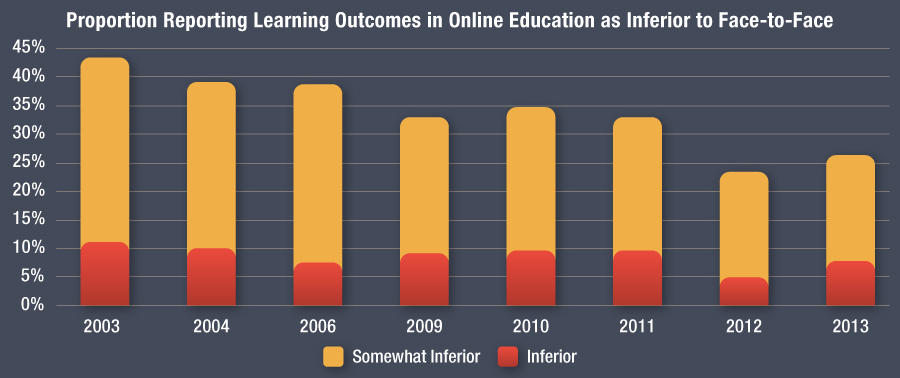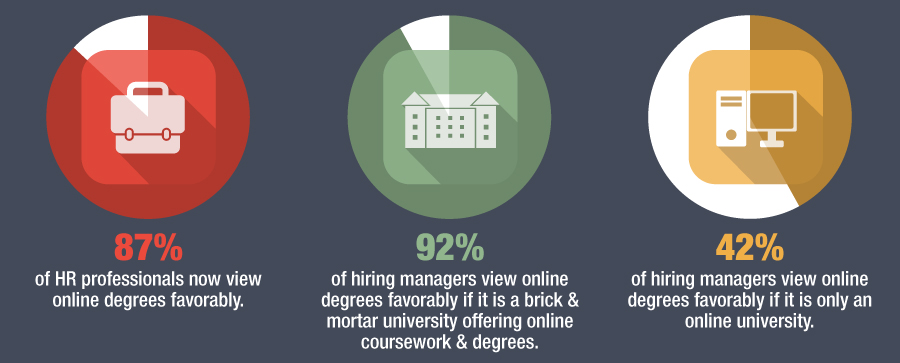Earning a degree or taking post-secondary courses online is no longer considered an oddity; 85 percent of all online degrees are offered by traditional, residential schools. In this regard, online programs, blended together with more traditional classroom lectures is very much a present-day phenomenon. It is also fact that year after year the number of online enrollments steadily increases its proportion of total enrollments, starting at 11.7% in 2003 and increasing to 32% in 2011.
But do employers respect those degrees earned at online colleges? The jury is still out on that question. Despite the job market growing kinder to online graduates, data indicates that many hiring managers are still wary of such degrees, even if from accredited online colleges. Still, the number of students taking online courses and working towards degrees can hardly be ignored by employers.
Hard to ignore: The number of additional students taking at least one online course continued to grow at a rate far in excess of overall enrollments. But the rate of increase was the lowest in a decade. This may turn out to be a trend. Only time, and future research will tell. Although the growth rate may be slowing, it is still much larger than the growth rate of the overall higher education student body. The increase from 1.6 million students taking at least one online course in fall 2002 to 7.1 million for fall 2012 represents a compound annual growth rate of 16.1 percent.
For the sake of comparison, the overall higher education student body has grown at an annual rate of 2.5 percent during this same period – from 16.6 million in fall 2002 to 21.3 million for fall 2012.

The notion that online education is “just as good as “face-to-face” instruction was not something that was widely believed 10 years ago by either academics or employment decision makers in the business world. Back in 2003, 42.8 percent of chief academic officers (CAOs) said they considered the learning outcomes for online instruction to be inferior to face-to-face.
How CAOs view online quality has, however changed over time. [We’ll discuss how employers feel about online quality later in this report.] According to a series of annual reports by the Babson Survey Research Group, there were small changes from 2003 through 2009, but the proportion of CAOs reporting that learning outcomes for online education were “Inferior” or “Somewhat Inferior” to those for comparable face-to-face courses held steady from 2009 to 2011.
By 2012, however, the proportion of academic leaders who considered online to be inferior dropped to 23 percent. Results for 2013 show a partial retreat, with the proportion considering online learning outcomes to be inferior edging up a few percentage points to 26 percent.

Even more important to graduating students than how academics view (or respect) online degrees is how human resources executives react to job candidates who come armed to employment interviews with online educational backgrounds. In a survey done by online institution Excelsior College and Zogby International, 61 percent of CEOs and small business owners nationwide said they were “familiar” with online or distance learning programs.
Not only are they familiar with them, but 83 percent of executives in the survey say that an online degree is as credible as one earned through a traditional campus-based program. Employers said such factors as the accreditation of the college or university, the quality of its graduates and the name of the institution awarding the degree were among other things they considered to make an online degree more credible.

As a result of online work being increasingly accepted by employers, there is no need to reveal in a cover letter or resume that you “earned your degree online.” Details about why you chose any particular type of school — such as a private school versus a public school or a Christian college versus a secular college — are best left to discussion during an actual interview. Even then, only want discuss the issue of online education if asked. We say “if asked” because GetEducated.com’s studies show that most employers are not overly concerned about how a degree was earned. They are, however, very concerned about overall school reputation and educational quality.
In the corporate sector, the increased utilization of training, professional development, and certification programs that are conducted over Internet connections, both synchronously and asynchronously has contributed to the overall growing acceptance of online education.
Many corporations are hiring applicants with online degrees, or providing tuition reimbursement. As more traditional and quality institutions begin to offer these programs, they will become more common and widely accepted.
But (and this is important) make sure your school is accredited. And remember to watch out for diploma mills and degree mills, some of which are accredited —but by fake or phony agencies that the degree mills themselves own and operate!
Sources:
http://www.learninghouse.com/wp-content/uploads/2013/06/Online-College-Students-2013_Final.pdf
http://www.accreditedonlinecolleges.org
http://www.usnews.com/education
http://www.pearsonlearningsolutions.com/assets/downloads/reports/changing-course-survey.pdf
 Follow
Follow